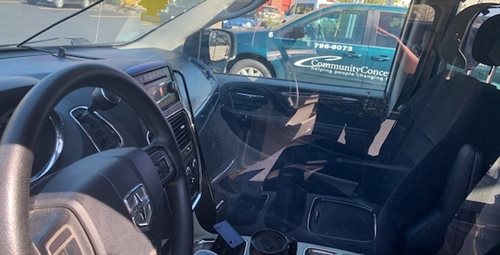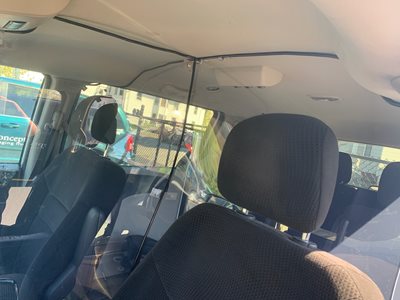NeighborWorks America's network organizations pivoted quickly over the last year to make sure their residents were safe. They provided rental assistance. They provided food. And some even partnered with health departments to respond directly to the pandemic.
Eight network organizations reported working with community residents who contracted coronavirus, assisting them with supplies so they could continue to quarantine, according to a NeighborWorks survey. Another 13 network organizations helped set up COVID-19 testing sites in their communities, an assist to health departments.
 Across the country, health outlets are working to perform nearly two million diagnostic tests a day, according to the COVID Tracking Project. Nearly 270 million tests have been performed to date in the United States and United States territories.
Across the country, health outlets are working to perform nearly two million diagnostic tests a day, according to the COVID Tracking Project. Nearly 270 million tests have been performed to date in the United States and United States territories.
Community Partners of South Florida helped with coronavirus education and more. Jaime-Lee Bradshaw, chief strategic initiatives officer for Community Partners of South Florida, says the health department chose the organization because of its history of community engagement. Community Partners also has a history of working alongside other nonprofits – another thing many NeighborWorks organizations have done this year.
Community Partners took on several healthcare roles, using its $360,000 grant from the county to help "stop the spread." Their mission involved increasing education and awareness about COVID-19, distributing masks, and connecting people who had tested positive for COVID-19 with the community's contact tracers.
"Our connection rate was over 91% as an agency," Bradshaw said. But not everyone they reached through phone calls, texting, or mail followed up with the health department.
Still, by December, Community Partners had participated in over 1,343 outreach activities and events, provided education, awareness information and training to 33,043 residents, and distributed more than 35,500 masks.
County funding was set to end on Dec. 31, but with the most recent federal relief act, the contract was extended. Coupled with individual appeals for funding by the organization's CEO, Bradshaw says the program should continue for another six months. That's important, she says, especially for communities of color, who were disproportionately affected by COVID-19. She also hopes to find dollars to help with vaccination education. The COVID connection program, which required Community Partners to hire an additional 15 community health workers, fit in with the organization's own strategic plan of fighting inequities.
Bradshaw said it was natural for Community Partners to expand their reach. "This health pandemic has exacerbated so many inequities," she said. "It's a health issue, but it's also a housing issue, it's an employment issue, it's an educational issue." And it proves, she says, that all of these aspects are interrelated. "If organizations continue to think they can be siloed, they're going to have an issue."
On the ground
In New Hampshire, NeighborWorks Southern New Hampshire connected churches with the health department to host a pop-up COVID testing site during a long, hot day this summer. "We provided some extra support," says Erica Brooks, community building manager. That included offering their community room as respite for the firefighters conducting the testing. It also included translating testing flyers into Spanish to get more people to the site. The organization texted all of their tenants to let them know about the testing. "We wanted as many people as possible in our neighborhood to know they could get tested for free," Brooks says. Seventy people got testing.
Counties report improved testing over the months, but during spring and summer, especially, testing sites were not available in every county, and more rural counties reported no testing sites than urban counties.
In Rhode Island, the Providence-area health department asked ONE Neighborhood Builders, a NeighborWorks organization, to help with three different healthcare tasks: To support people who were quarantining after contracting coronavirus; to increase testing; and to educate the community about testing, quarantine, and isolation support. They forged new partnerships after the Department of Health asked them to expand their services.
"We tried to educate the public about contact tracing," says Laurie Moise Sears, director of community health integration for ONE Neighborhood Builders. "We tried to break the stigma around that."
The health department sent the organization names of families who were dealing with coronavirus, and ONE Neighborhood Builders followed up to see what the families and individuals needed. Sometimes, it was dropping off food from the food pantry. Sometimes, it was delivering diapers or baby formula. "We had to find a way to do it within 24 to 48 hours so folks could stay home and isolate," Sears said.
With community health workers onsite – they added two when the pandemic hit – they were able to address needs in nine neighborhoods. They also worked with local partners to address other needs in the community, including childcare and domestic violence. "Anything across the board we try to address," she said. The pandemic impacted everything.
"There are some days where the state of Rhode Island is reaching 1,000-plus cases. Last week we were at capacity in our hospital. But we've learned a lot more than we knew back in the spring. Now we know the needs of our community and we can get them what they need."
In Maine, community action agencies like Kennebec Valley Community Action Program Housing Services have contracts with Maine Department of Health and Human Services to provide supportive services to people in quarantine.
"It's been an intense program," says Michele Prince, chief operating officer. Some people need little help. Others need groceries, Tylenol or thermometers or referrals for economic assistance programs. Some need help finding new shelter so they can quarantine away from crowded homes. And if a family member dies, staff members help support the family through that time.
The organization hired a new employee to help with the calls and with the organization's new Emergency Assistance Program. But other staff members help, too – the mandate is to respond within four hours' notice between 7 a.m. and 7 p.m., seven days a week.
"Since the beginning, we've had 87 referrals," Prince says. People have a lot of questions about care and quarantine dates. "It gets complicated."
Helping when they can
In nearby Lewiston, Community Concepts has a similar contract. There, staff members are delivering food and making pharmacy trips for patients. "Cleaning supplies are big," says Sandy Albert, who runs the program. "It's basically anything that will help them stay in quarantine without having to leave."
Community Concepts contacts quarantined residents every other day. So far, they've received 110 referrals. The organization initially expected this to be a short-term initiative. "It's been seven months," says Mary-Rita Reinhard, chief operating officer. "It's become a full program."
 As in Kennebec, the organization transports residents to a COVID shelter if they need to isolate away from family. They transport individuals to their homeless shelter in a local hotel as well. Part of the contract with Health and Human Services included retrofitting some of their vehicles with plexiglass, so there would be a safety screen between the driver and the passengers. That also means they can drive potentially COVID-positive passengers to testing sites when necessary.
As in Kennebec, the organization transports residents to a COVID shelter if they need to isolate away from family. They transport individuals to their homeless shelter in a local hotel as well. Part of the contract with Health and Human Services included retrofitting some of their vehicles with plexiglass, so there would be a safety screen between the driver and the passengers. That also means they can drive potentially COVID-positive passengers to testing sites when necessary.
Albert also mentions the importance of partnerships for the organization. As an example, she references Catholic Charities, which helps with interpretation and with recommending culturally appropriate foods, such as halal foods, which prescribe to Muslim law, for quarantining residents.
Albert says some of the people they serve are families who wouldn't normally be eligible for a community action agency program. "Some have higher incomes but once you're in isolation and quarantine, you can't get food. COVID does not discriminate." The positive here, she says, is that more people learn what Community Concepts does for the community.
Other NeighborWorks organizations have become more known, too, as the pandemic finds them working at the center of health and housing.
01/11/2021

